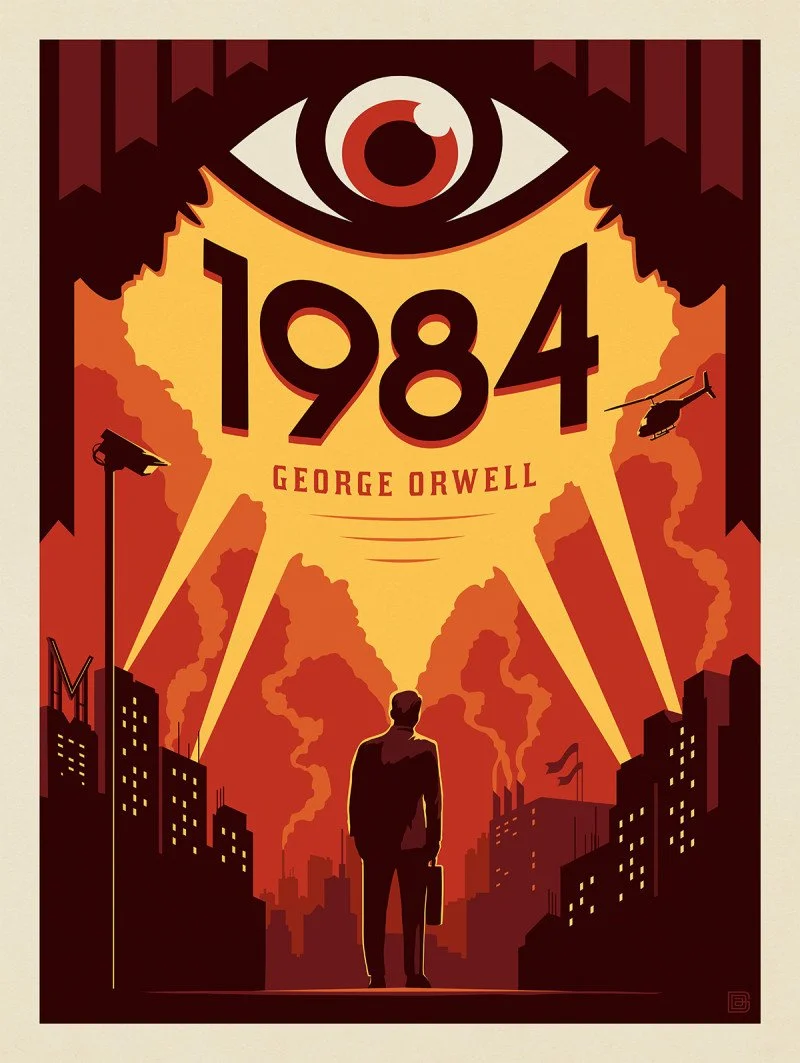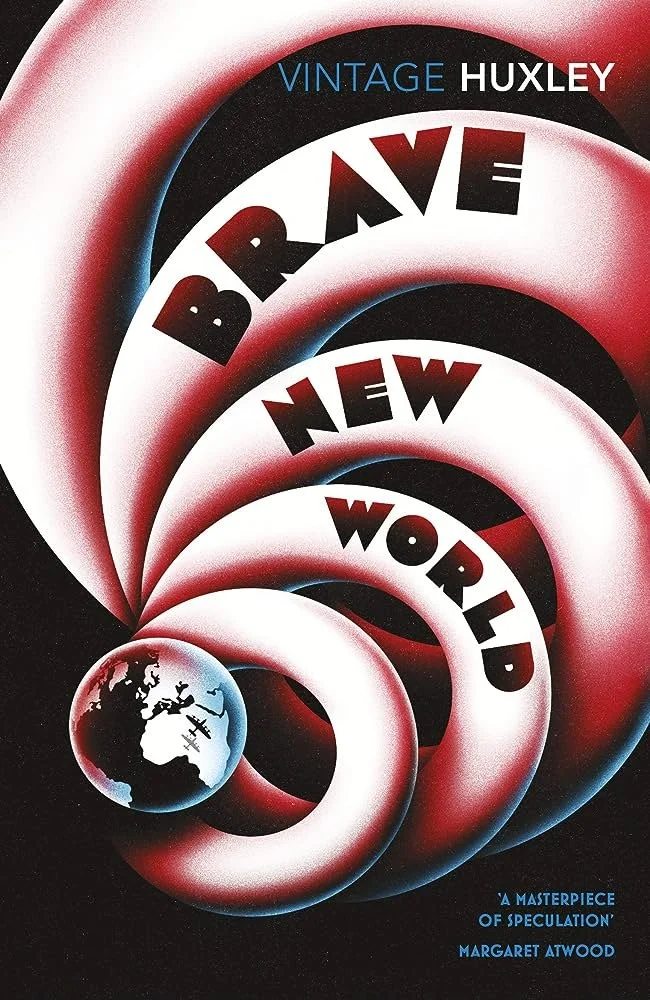Dystopia
1984
"1984" is a dystopian masterpiece written by George Orwell that serves as a chilling warning about the dangers of totalitarianism, surveillance, and the erosion of individual freedoms. This iconic novel, published in 1949, remains a cornerstone of modern literature and a powerful exploration of the human condition under oppressive regimes.
Set in the totalitarian state of Oceania, "1984" follows the life of Winston Smith, a low-ranking party member whose job involves altering historical records to conform to the ever-changing propaganda of the ruling Party and its mysterious leader, Big Brother. Winston becomes discouraged with the oppressive regime and begins to secretly rebel against its control, seeking truth and freedom in a world where dissent is a crime.
Orwell's dystopian vision is characterised by pervasive government surveillance, manipulation of language (Newspeak), and the suppression of individual thought and expression. The novel examines the harmful effects of censorship, the rewriting of history, and the manipulation of truth as tools for maintaining political power.
The Handmaid's Tale
"The Handmaid's Tale" is a haunting and dystopian novel explores a future society that is characterised by oppression, religious extremism, and the subjugation of women.
Set in the near-future Republic of Gilead, the story follows the life of Offred, a woman who has been reduced to the role of a "handmaid." In this totalitarian society, fertility has become a rare commodity due to environmental pollution, and handmaids are assigned to bear children for the ruling class. They are subjected to strict control, surveillance, and a system of indoctrination that enforces conformity.
As Offred navigates her bleak existence, she reflects on her past life, the loss of her family, and her yearning for freedom and independence. The novel looks at the themes of gender inequality, reproductive rights, religious fundamentalism, and the consequences of a society ruled by authoritarian ideology.
Brave New World
"Brave New World" is a dystopian masterpiece written by Aldous Huxley. This novel presents a cautionary tale about a future society where conformity, consumerism, and the pursuit of pleasure have taken precedence over individuality, personal freedom, and genuine human connections.
Set in the World State, a highly engineered and tightly controlled society, citizens are genetically bred, conditioned, and classified into distinct castes, each with predetermined roles and expectations. People are conditioned to embrace conformity, consumption, and instant gratification, while the government uses advanced technology, psychological manipulation, and the drug "soma" to maintain stability and suppress dissent.
The story follows Bernard Marx, an intellectual misfit, and Lenina Crowne, a citizen who adheres to societal norms, as they navigate the restrictive world around them. When they venture outside their controlled environment and encounter a "Savage" society that values individuality and emotions, they are faced with a profound clash of values and ideologies.
Fahrenheit 451
"Fahrenheit 451" is a classic dystopian novel written by Ray Bradbury. This story offers a powerful exploration of censorship, the suppression of ideas, and the importance of preserving literature and free thought.
Set in a future society where books are banned and "firemen" are tasked with burning any that are found, the story follows Guy Montag, a fireman who begins to question the oppressive regime he serves. Montag's awakening to the value of books and his growing resistance to the conformity and mindlessness of his society lead him on a perilous journey to escape the oppressive grasp of a government that controls the minds of its citizens.
Ray Bradbury conveys a world where intellectualism and free expression are under siege, and where the pursuit of knowledge and individuality is an act of rebellion. The novel explores themes of censorship, the power of literature to challenge societal norms, and the consequences of a culture obsessed with mindless entertainment.
The Road
"The Road" is a post-apocalyptic novel written by Cormac McCarthy. This bleak and emotionally charged story follows the harrowing journey of a father and his young son as they navigate a desolate and ravaged world in search of safety and hope.
Set in an unspecified future after an unexplained cataclysmic event has left the world in ruins, the novel follows the unnamed father and son as they embark on a perilous journey south, hoping to find warmth, food, and refuge from the merciless and lawless survivors who now inhabit the wasteland.
Cormac McCarthy paints a stark picture of a world devoid of civilisation, filled with desolation, despair, and the constant threat of danger. The novel explores themes of survival, love, and the enduring bond between a parent and child as they face the unforgiving challenges of an unfathomable world.
A Clockwork Orange
"A Clockwork Orange" is a provocative and controversial novel written by Anthony Burgess. This dark and dystopian tale offers an exploration of societal violence, the nature of free will, and the consequences of authoritarianism.
Set in a bleak and not-too-distant future, the story is narrated by Alex, a young and violent delinquent who takes pleasure in acts of brutality, theft, and sexual assault. The novel follows Alex's life of crime and his eventual capture by the authorities. In prison, he becomes the subject of an experimental rehabilitation program that seeks to condition him into a passive and non-violent state.
The novel is renowned for its use of "Nadsat," a fictional teenage slang that immerses readers in the unsettling and disorienting world of the story. As the narrative unfolds, readers are confronted with moral dilemmas surrounding the use of psychological conditioning to suppress violence and the loss of individual agency.
The Sheep Look Up
"The Sheep Look Up" is a thought-provoking and environmentally conscious science fiction novel written by John Brunner. This story offers a stark exploration of the consequences of environmental degradation, corporate greed, and societal apathy.
Set in a near-future world, the novel paints a grim picture of a planet in crisis, plagued by pollution, overpopulation, and ecological collapse. The story follows a diverse cast of characters, each grappling with the ever-escalating environmental and social challenges they face.
As the environment deteriorates, public health deteriorates as well, with rampant disease and ecological disasters becoming the norm. The novel's title refers to the idea that people are like sheep, blindly following the status quo and ignoring the impending ecological catastrophe.
Never let me go
"Never Let Me Go", written by Kazuo Ishiguro, is a contemplative story that offers a deeply emotional exploration of love, identity, mortality, and the ethics of science and technology.
The narrative is set in an alternative version of England where human clones, known as "students," are raised in specialised institutions for the sole purpose of donating their organs to "normals" in need. The story is narrated by Kathy, one of these clones, as she reflects on her upbringing, friendships with fellow clones Ruth and Tommy, and the inevitable fate that awaits them.
As Kathy and her friends grow up, they grapple with the harsh reality of their existence, questioning their purpose, the societal norms that govern their lives, and the fleetingness of their time together. The novel explores themes of love, loss, and the search for meaning in a world that seems to have predetermined their destinies.







